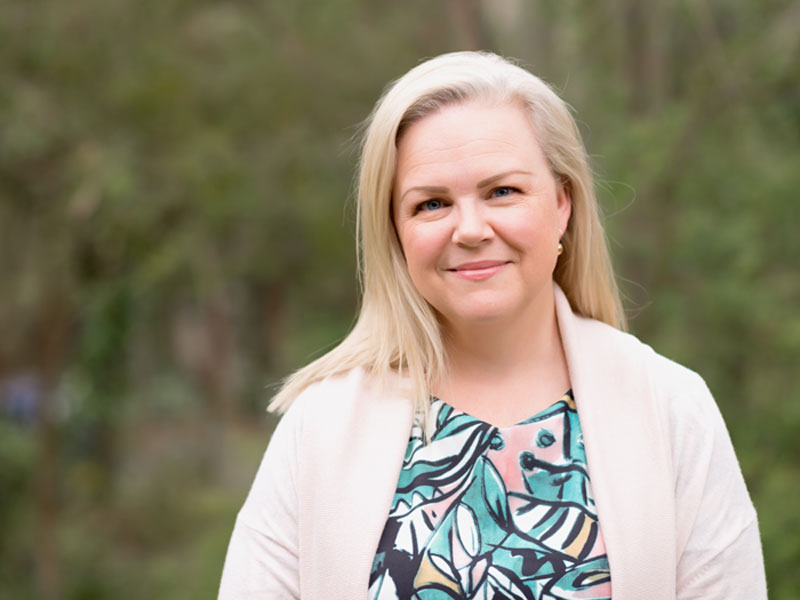Researcher Highlights
Sally Hunt - Cheers to better mental health
Sally Hunt
Dr Sally Hunt is helping to curb our nation’s alcohol addictions through evidence-based interventions—and by understanding and addressing the reasons people turn to drink in the first place.

A few beers at the pub. A glass of wine with dinner. In Australia, alcohol consumption has arguably become embedded in our social culture. But what happens when drinking behaviours get out of hand?
Dr Sally Hunt is investigating the interconnected nature of mental health and substance abuse. Her work is driving innovative new prevention programs and interventions for Australians, with a focus on women’s health. It’s also sparking important, yet sometimes difficult, conversations about how much we drink and why.
“Ultimately, I would like to change the way that Australians think about alcohol so that we can make informed choices about when and how much to consume.”
The cost of alcohol abuse
As a clinical psychologist, Sally has seen the ugly side of alcohol consumption firsthand.
While she doesn’t oppose the odd glass of wine, she also understands how alcohol can become a crutch for people dealing with mental illnesses such as anxiety, or with the stresses of work and life.
But in a culture where excessive alcohol consumption is often normalised, identifying and managing alcohol abuse poses a national challenge.
“In Australia, there is a tendency to downplay the impact and associated harms of alcohol abuse—such as its contribution to around one-third of road traffic injuries—especially in comparison to known harms of other abusive substances.
“Additionally, many people downplay or aren’t aware of how much alcohol constitutes hazardous use. For example, as little as three drinks per week increases a woman’s risk of breast cancer by around 15 per cent.”
Underlying stress factors
To help combat alcohol abuse among women, Sally is investigating the primary reasons why many choose to drink in the first place. Understanding these key drivers is the first step to helping people recover their mental health and wellbeing long-term.
“My research work aims to raise awareness of the pressures experienced by many women and the role that hazardous alcohol consumption has come to play in coping with this stress.”
Sally’s research is helping to develop and implement evidence-based interventions for mental health and substance use problems that can reach a broad audience. At the same time, she’s also supporting training for early-career psychologists who treat people dealing with addictions.
“I get an enormous sense of joy from teaching early-career psychologists and providing them with the support they need to become clinicians of whom our profession can be proud.
“Alongside my role as educator, my clinical work in mental health and research settings is helping to deliver specialised psychological care for comorbid mental health and substance use problems.
“I plan to develop an evidence-based intervention specifically for women to help them manage the pressures of their lives in a healthy and sustainable way—without needing alcohol as a stress reliever.”
Getting the nation talking
As a clinical psychologist, researcher, and educator, Sally has always been passionate about helping people to regain their mental health and wellbeing. Initially, this was achieved one-by-one in the therapy room. Today, Sally’s work is reaching a much larger audience.
“Nationally, my research is starting to make an impact. I’ve been invited to speak to large audiences through radio and newspaper interviews, podcasts and conference keynote lectures.
“I am hopeful that the narrative around alcohol use—especially women’s use of alcohol—has started to change in recent years, and that my voice has contributed to that.”
So, exactly how much is too much when it comes to drinking alcohol? For those looking to prioritise their health, the age-old adage ‘everything in moderation’ is a great starting point.
“A great many alcohol related health and mental health harms would be reduced if we thought of alcohol in the same way we think about sugar—as a ‘sometimes food’. It can be enjoyable in small doses, but it’s not ideal to consume in large amounts every day.”
The University of Newcastle acknowledges the traditional custodians of the lands within our footprint areas: Awabakal, Darkinjung, Biripai, Worimi, Wonnarua, and Eora Nations. We also pay respect to the wisdom of our Elders past and present.
